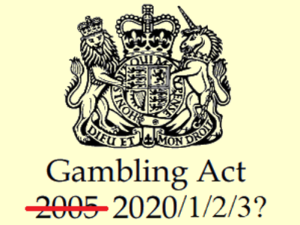Would Horse Racing Still Exist If Gambling Was Banned?
 Horse racing has been synonymous with sports betting for many, many years. At one point, it was the primary and sole betting option and remains so in various countries around the world. Perhaps if horse racing had never come into existence there wouldn’t be such a demand for sports betting today given the rise of both are intrinsically linked. In fact, so popular is the sport that people dress in their finest attire to attend the races, including the Grand National and Ascot. And while attending these events visitors get to place wagers on their favoured runners. It is often seen are part and parcel of the sport and few would image going to watch horse racing without having a bet.
Horse racing has been synonymous with sports betting for many, many years. At one point, it was the primary and sole betting option and remains so in various countries around the world. Perhaps if horse racing had never come into existence there wouldn’t be such a demand for sports betting today given the rise of both are intrinsically linked. In fact, so popular is the sport that people dress in their finest attire to attend the races, including the Grand National and Ascot. And while attending these events visitors get to place wagers on their favoured runners. It is often seen are part and parcel of the sport and few would image going to watch horse racing without having a bet.
But the question here is whether or not horse racing would continue to exist if gambling was banned in the United Kingdom. Indeed, there are special rules and laws in place, including dedicated tax levies, to protect the sport and ensure it continues. The likelihood is that horse racing events will continue to be protected in the new gambling laws being introduced to the country in due course. The white paper for those new laws surrounding UK gambling has once again been postponed for the umpteenth time, leading to masses of criticism from campaigners.
Many have suggested that even with more stringent laws introduced on the gambling scene in the UK, horse racing would continue to flourish. Perhaps it would do so in a bit more of a niche sector but survive it would. Yet what sort of an industry would the horse racing become without gambling being availabe? Would it be as easy for the sector to sell horse racing to people if betting on the events wasn’t available?
Gambling Review Poses “Clear and Present Danger”
 Leaders within the field of horse racing were warned back in February (when the white paper on gambling reform was expected in March) that the upcoming weeks would be “absolutely critical” to the future of the sport. The Betting and Gaming Council CEO Michael Dugher said that the British horse racing industry faced “a clear and present danger”, should ministers get the proposals included in the white paper wrong. He went on to say that the gambling industry’s fight against dramatic changes is the racing industry’s fight as well.
Leaders within the field of horse racing were warned back in February (when the white paper on gambling reform was expected in March) that the upcoming weeks would be “absolutely critical” to the future of the sport. The Betting and Gaming Council CEO Michael Dugher said that the British horse racing industry faced “a clear and present danger”, should ministers get the proposals included in the white paper wrong. He went on to say that the gambling industry’s fight against dramatic changes is the racing industry’s fight as well.
It was in December of 2020 that the UK Government launched its review of the Gambling Act 2005, hoping to make it “fit for the digital age”. Yet this has brought about widespread concern within the horse racing industry regarding the potential outcomes of the review. Affordability checks were one of the primary suggestions rumoured to be included in the new gambling legislation. Those within the British racing industry have stated that if these checks are too intrusive (with suggestions that players would have to display bank statements to prove their income) it could heavily affect finances.
Checks on finances after monthly losses of as low as £100 could end up costing the British racing sector £60 million per year or more, according to some estimates. And when you consider that there have also been calls for the ban of betting sponsorship and television advertising relating to gambling companies, this could also impact the coverage of horse racing events by channels like ITV.
“Racing without betting simply wouldn’t exist”,
said Dugher during an interview with the Racing Post.
“I know racing would rather spend the day arguing among themselves. I think Julie Harrington (British Horseracing Authority Chief Executive) has a hero’s task dealing with her members. People in the racing industry, these people could start a fight in an empty room. But they really need to get themselves together and say there is huge amounts of commonality here, not least a clear and present danger to the future of their sport, and everyone in racing needs to get off their backside.”
Back in February of 2022, Chris Philp, who serves as the UK Gambling Minister, said that the government intended to make sure the review of the gambling act would not “undermine the financial condition” when it comes to British racing. That was a statement welcomed by Harrington. But Dugher counteracted that by saying that any reforms which went on to reduce the size of the regulated gambling industry in the country would affect racing greatly. He said that thinking any other way was simply “naïve”.
What Restructuring Means For The Racing Industry

If the review of the gambling act did introduce sturdier laws, then it may be the case that the UK follows in a similar path to some other countries, where all gambling activity is banned other than on horse racing. That’s highly unlikely to be the case, because the government knows how lucrative the betting industry is for tax revenue. In the 2021-22 tax year, the treasury received almost £3.1 billion in tax receipts from it, so introducing exceptionally strident legislation would be detrimental to this.
Betting on horse racing is something that many countries provide, and in some instances, it is the only type of sports betting permitted. Brazil, for example, has a legal ban on all types of games of chance, with the exception of the state-run lottery and horse racing wagering. The same was true of Argentina until recently. Some states in India outrightly ban sports betting altogether, while horse racing remains as the only legal option in others. Horse racing betting is also legal in the Philippines but exists as the only sport that is for such activity. You could also look at the United Arab Emirates, or more specifically Dubai, for a similar sort of setup.
Could the United Kingdom provide such a setup for bettors to get behind? Probably not, because many people like betting on football, tennis and other popular sports as well. If horse racing was the only option that they had to go for, the likelihood is that most gamblers would either turn to underground gambling or give it up altogether. The latter of these would essentially see the industry rendered unnecessary in the UK, while the former would see the government lose out on betting taxes.
Strangely enough, in July of 2020, it was reported that the House of Lords was firmly behind a blanket ban on gambling advertising in sports (which has recently been pinpointed as something that has held up the publication of the white paper). However, in that same report, it was recommended that horse racing and greyhound racing should be exempt from these restrictions. The reasoning behind this was that while “the removal of sponsorship would not unduly harm Premier League clubs”, it would like “have a serious effect on smaller clubs”. It was also noted that greyhound racing “would probably not exist in this country without the contribution of the gambling industry.”
What Impact Could Restrictions Have On Horse Racing?
 While it is very, very unlikely that an entire ban on gambling will be introduced in the UK, there is the chance that heavy restrictions could be introduced. Could they actually have such a significant knock-on effect on the horse racing industry? Do people really need to bet on the horses running in races to have a good time?
While it is very, very unlikely that an entire ban on gambling will be introduced in the UK, there is the chance that heavy restrictions could be introduced. Could they actually have such a significant knock-on effect on the horse racing industry? Do people really need to bet on the horses running in races to have a good time?
Well, how does the industry make money? Racecourses themselves exist in the same way as any other sporting arena, so people attending the races are charged an entry fee for getting in. Obviously, the races are known to have champagne, beer, food and other hospitality items on offer that people can spend their money on. And a portion of all proceeds from this go towards the horse racing industry.
At the same time, television companies including ITV, Sky Racing and others, pay for the right to broadcast the races. Yet a large chunk of the funds for horse racing comes from sponsorship, and multiple sports betting companies have signed into deals to provide funds to the horse racing scene for promotion of their platforms. This results in their billboards being displayed, trophies and races being named after the companies, and so on. Without a doubt, the removal or reduction of gambling possibilities would likely have a knock-on effect. How significant that effect would be is anyone’s guess.
However, with rules and legislation in place to protect the horse racing industry in the UK, horse racing would likely continue in any case. It is also likely that it will remain protected within the new white paper, so little should be expected to change on that front. It’s just that without as much gambling activity taking place on horse racing, the activity would become a lot more niche.
When most people go to racecourses they don’t just go to watch and have a few drinks and a good time with friends. They go to place bets on various horses. And this has become a common part of attending the races for many people. Without it, would this also reduce the number of people wanting to attend the events themselves? It’s a valid question – but unless it was something that was actually introduced, it cannot be said what the answer would be.
Yet you only need to look at newspaper publications like The Guardian, who are largely critical of gambling, to see how synonymous with horse racing the betting industry is. Hints and tips, predictions and more are posted on a frequent basis, and this is likely done because people want to know which route they should take when it comes to engaging in sports betting on the races. And these types of publications are put out for the range of UK and Irish racing events that occur throughout the year, as well as those that take place even further afield.
It could be suggested that sports betting is absolutely a key and critical part of the horse racing scene. Not only could the removal or heavy restriction of gambling have a monetary impact on the sector, but on attendance and spectator figures at races as well. Bookmakers may be encouraged to plough a certain percentage of their profits back into the horse racing world, but if they’re not going to be able to display their banners or receive promotion back from racecourses under new law, then there’s nothing in it for them. There needs to be a give and take ethic behind such partnerships for them to work. If they were to pull out of such deals due to a change in law, then their funding and sponsorship of such events would break that link between betting and horse racing.
Without a doubt, horse racing is a sport first and foremost. There is no question about this. But for many decades, it has pretty much gone hand-in-hand with sports betting. Odds are provided on every horse race taking place across the UK and Ireland, and even beyond, with hundreds of bookmakers offering such. What’s more, millions of avid punters back their favourite runners on a daily or weekly basis with these sportsbooks. Just as with any other kind of business, the two of them go together perfectly so as to provide a brand that millions of people want to get involved in frequently. A good bookmaker profits from that eagerness of people wanting to bet for enjoyment. And as a result, the horse racing industry profits at the same time.
Time will tell whether the upcoming changes to the Gambling Act 2005 have such a dramatic effect on the horse racing scene. And just how much of a problem this will be for the sports betting industry is something else that people will be waiting on tenterhooks for.



